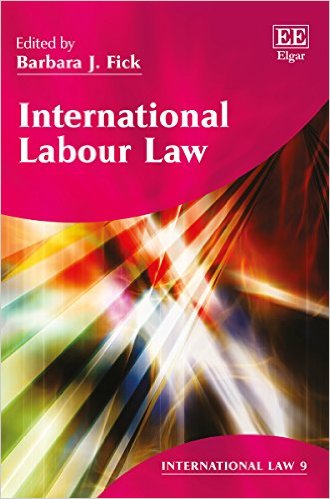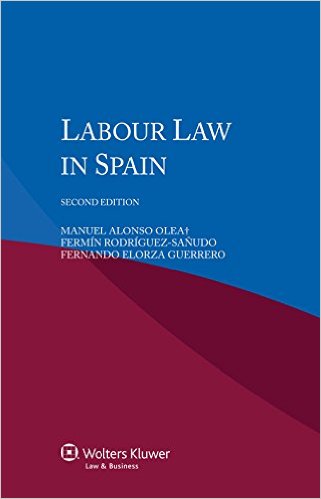
단행본
International labour law
- 청구기호
- 344.0105 INT2015
- 발행사항
- Cheltenham, UK ; Northampton, MA, USA : Edward Elgar Publishing, 2015
- 형태사항
- 882 p
- 서지주기
- Includes bibliographical references
- ISBN
- 9781783476022
소장정보
| 위치 | 등록번호 | 청구기호 / 출력 | 상태 | 반납예정일 |
|---|---|---|---|---|
지금 이용 불가 (1) | ||||
| 한국노동연구원 | 00008478 | 대출중 | 2019.12.07 | |
지금 이용 불가 (1)
- 등록번호
- 00008478
- 상태/반납예정일
- 대출중
- 2019.12.07
- 위치/청구기호(출력)
- 한국노동연구원
책 소개
This timely volume provides a selection of seminal articles that analyze and debate current key topics in the field of international labour law. In particular, the collection focuses on the central role of the International Labour Organization (ILO) in the adoption and enforcement of labour standards, as well as the normative content of ILO Conventions forming the basis for the ILO Declaration on Fundamental Principles and Rights at Work. Additional articles critically consider non-ILO mechanisms for enforcing labour standards and assess their effectiveness and practicality. The final group of articles reflect on the future of international labour law and how it is impacted by the ILO Declaration, the dialogue on human rights and changes in the nature of the labour market in a global economic system.
목차
Introduction Barbara J. Fick
PART I THE ROLE OF THE ILO IN THE INTERNATIONAL LABOUR LAW REGIME
1. Laurence R. Helfer (2006), ‘Understanding Change in International Organizations: Globalization and Innovation in the ILO’, Vanderbilt Law Review, 59 (3), April, 649¬–726
2. Nicolas Valticos (1977), ‘Comparative Law and the International Labour Organization’, Comparative Labor Law, 2, 273–88
3. Francis Maupain (1999), ‘The Settlement of Disputes Within the International Labour Office’, Journal of International Economic Law, 2 (2), June, 273–93
4. Alfred Wisskirchen (2005), ‘The Standard-Setting and Monitoring Activity of the ILO: Legal Questions and Practical Experience’, International Labour Review, 144 (3), September, 253–89
5. Edward Weisband (2000), ‘Discursive Multilateralism: Global Benchmarks, Shame, and Learning in the ILO Labor Standards Monitoring Regime’, International Studies Quarterly, 44 (4), December, 643–66
PART II SUBSTANTIVE CONTENT OF THE CORE LABOUR RIGHTS
6. Harold Dunning (1998), ‘The Origins of Convention No. 87 on Freedom of Association and the Right to Organize’, International Labour Review, 137 (2), 149–67
7. Jane Hodges-Aeberhard (1989), ‘The Right To Organise in Article 2 of Convention No. 87: What is meant by Workers “Without Distinction Whatsoever”?’, International Labour Review, 128 (2), 177–94
8. Jane Hodges-Aeberhard and Alberto Odero de Dios (1987), ‘Principles of the Committee on Freedom of Association Concerning Strikes’, International Labour Review, 126 (5), September–October, 543–63
9. Lee Swepston (2013), ‘Crisis in the ILO Supervisory System: Dispute over the Right to Strike’, International Journal of Comparative Labour Law and Industrial Relations, 29 (2), 199–218
10. Bernard Gernigon, Alberto Odero and Horacio Guido (2000), ‘ILO Principles Concerning Collective Bargaining’, International Labour Review, 139 (1), March, 33¬–55
11. Henrik Karl Nielsen (1994), ‘The Concept of Discrimination in ILO Convention No. 111’, International and Comparative Law Quarterly, 43 (4), October, 827–56
12. Mike Kaye (2009), Forced Labour in the 21st Century, Anti-Slavery International and The International Confederation Of Free Trade Unions, 1–21
13. Breen Creighton (1997), ‘Combating Child Labour: The Role of International Labour Standards’, Comparative Labor Law Journal, 18, 362–96
14. Karl Hanson and Arne Vandaele (2003), ‘Working Children and International Labour Law: A Critical Analysis’, International Journal of Children’s Rights, 11 (1), 73–146
PART III ENFORCEMENT MECHANISMS OUTSIDE THE ILO
15. Margaret Levi, Christopher Adolph, Daniel Berliner, Aaron Erlich, Anne Greenleaf, Milli Lake and Jennifer Noveck (2013), ‘Aligning Rights and Interests: Why, When and How to Uphold Labor Standards’, Background Paper for the World Development Report, 1-38
16. Jan Martin Witte (2008), ‘The Potential and Limits of Codes of Conduct and Standards in Fostering Core Labor Standards’, in Realizing Core Labor Standards: The Potential and Limits of Voluntary Codes and Social Clauses. A Review of the Literature, Chapter 4, Eschborn, Germany: Deutsche Gesellschaft für Technische Zusammenarbeit (GTZ) GmbH, 52-76
17. Axel Marx and Jan Wouters (2013), ‘Redesigning Enforcement in Private Regulation – The Case of International Labor Governance’, Working Paper No. 126, Leuven Centre For Global Governance Studies, November, 1–20
18. Leyla Davarnejad (2011), ‘In the Shadow of Soft Law: The Handling of Corporate Social Responsibility Disputes Under the OECD Guidelines for Multinational Enterprises’, Journal of Dispute Resolution, 2011 (2), 351–85
19. Brian W. Burkett (2011), ‘International Framework Agreements: An Emerging International Regulatory Approach or a Passing European Phenomenon?’, Canadian Labor and Employment Law Journal, 16, 81–114
20. Renée-Claude Drouin (2010), ‘Promoting Fundamental Labor Rights through International Framework Agreements: Practical Outcomes and Present Challenges’, Comparative Labor Law and Policy Journal, 31 (3), 591–636
21. Jan Martin Witte (2008), ‘A Trade Lever? The Potential and Limits of Promoting Core Labor Standards through Social Clauses’, Realizing Core Labor Standards: The Potential and Limits of Voluntary Codes and Social Clauses. A Review of the Literature, Chapter 3, Eschborn, Germany: Deutsche Gesellschaft für Technische Zusammenarbeit (GTZ) GmbH, 23-50
22. Franz Christian Ebert and Anne Posthuma (2010), ‘Labour Provisions in Trade Arrangements: Current Trends and Perspectives’, ILO Discussion Paper 205, 1-35
23. Lance Compa and Jeffrey S. Vogt (2001), ‘Labor Rights in the Generalized System of Preferences: A 20-Year Review’, Comparative Labor Law and Policy Journal, 22 (2–3), 199-238
PART IV REFLECTIONS ON CORE LABOUR RIGHTS AND THE FUTURE OF INTERNATIONAL LABOUR LAW
24. Philip Alston (2004), ’“Core Labour Standards” and the Transformation of the International Labour Rights Regime’, European Journal of International Law, 15 (3), June, 457¬–521
25. Brian A. Langille (2005), ‘Core Labour Rights – The True Story (Reply to Alston)’, European Journal of International Law, 16 (3), June, 409–37
26. Kevin Kolben (2010), ‘Labor Rights as Human Rights?’, Virginia Journal of International Law, 50 (2), 449–84
27. Harry W. Arthurs (2012), ‘Making Bricks Without Straw: The Creation of a Transnational Labour Regime’, in Gráinne de Búrca, Claire Kirkpatrick and Joanne Scott (eds), Critical Legal Perspectives on Global Governance: Liber Amicorum David M. Trubek, Chapter 7, Oxford, UK: Hart Publishing, 129–42


